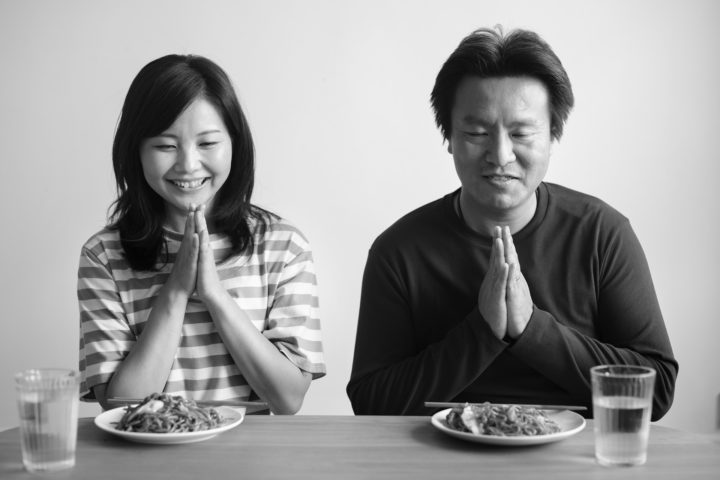This sermon originally appeared on AnderspeaK etc and is reproduced with permission.
PLATES
First, a little background on ancient Corinth. Before the time of Paul and the infant church, the city of Corinth had been famous for several temples of Aphrodite. We’ve already mentioned the nature of their practices, except for the offerings.
The temple buildings were usually empty inside except for a statue idol of the goddess. All kinds of sacrifices were made, but these usually took place outside the temple. Animals were slaughtered on the front patio, as it were, and the animals were “turned into smoke” on large braziers. The priests would help themselves to the best parts. They’d take the tri-tip and the bacon and return the inferior cuts — now nicely barbecued — back to the ones who brought the sacrifice. Then they would take their meat home and eat. Some temples had meeting rooms along each side of their length where a group which, say, brought a sacrificial cow, could gather and eat their steaks. Remember, there were no restaurants in Corinth — nothing in the archaeological record — but the temples provided the function of receiving sacrifices, barbecuing your meat for you, and in some cases providing you and your group a room to dine in.
The question naturally arose: “Should Christians be allowed to eat meat that had come from the pagan temple?” Is a Christian defiled by eating meat that had been part of a pagan sacrifice? Some Christians—then as now—would automatically offer an emphatic yes, for some would have believed that the meat was infused with demonic power or demons themselves. But this is not Paul’s perspective. Whether or not we eat meat sacrificed to idols is not an automatic no. The context determines everything.
GRAY SPACE
Paul has already established that food sacrificed to idols is not “demon infused” or anything of the kind. From chapter 8:
Hence, as to the eating of food offered to idols, we know that “no idol in the world really exists,” and that “there is no God but one.” — 1 Corinthians 8:41
Paul makes it clear that idols are not real. There is one God and God is not a god among other gods. The pagans of Corinth worship nothing if they do not worship The Lord.
“Don’t be afraid of food,” Paul says in effect, “because all food is a gift from God.” What makes food sacrificed to idols either good or bad is entirely a matter of context. How does food play out in your relationship with others?
Verse 24: Do not seek your own advantage, but that of the other.
There is no generosity in legalism. Legalists are all black-and-white with no shades of gray. For legalists, every moral question is like a simple light switch: two positions only — on or off — and nothing in between. Things are either good or evil with little flexibility. And many legalists find the idea of taking the context into consideration a slippery slope to sin.
Paul shows us that legalism is too narrow a view. We need to replace all our light switches with rheostats — dimmer switches. The light isn’t merely on or off, but operating at a variable percentage of luminosity. You have dimmer switches at home, don’t you? Like adjusting the volume on a stereo, you adjust the intensity of the light according to the time of day, purpose, or mood.
As to black-and-white, consider the spectrum: when you think of it, black and white are merely the endpoints of the spectrum. Between black and white there are hundreds — maybe thousands — of shades of gray. Why in the world would we eliminate them? Perhaps because we are drawn to certainty, and when it comes to moral questions, we don’t like gray space. We prefer to have every matter settled. That’s the recipe for legalism.
AFTER THE LAW
In verse 23 Paul says, “All things are lawful, but not all things are beneficial.” This is the exact same wording as we saw in chapter 6:12: “All things are lawful, but not all things are beneficial.” And we discussed how the word translated “beneficial” is closer to the word “conductive.” All things are lawful, not all things are conductive — not all things complete the circuit and keep the current of the Holy Spirit flowing.
When Paul says “all things are lawful,” he does not mean that all behaviors are good and of equal value. He means that we live asking different kinds of questions. In his background as a Pharisee, the key, leading question for anything began, “Is it lawful to (fill in the blank)?” Remember how Jesus was pummeled by this kind of question? “Rabbi, is it lawful to heal a man on the Sabbath?” “Is it lawful for a man to divorce his wife?” “Is it lawful to pay taxes to Caesar?” and so on. But “Is it lawful?” is no longer the question, because, as Paul says, “all things are lawful.”
The question now is “Is it helpful?” “Is it beneficial?” or as we’ve indicated, “Is it conductive?” As to the question, “Is it wrong to eat meat that’s been sacrificed to idols?” we don’t concern ourselves with legalisms, but with the effect upon our relationships. It’s not, “What foods are right or wrong to eat?” but rather, “How does what I’m doing help or hurt the gospel?” How does what I do affect my witness to Christ? The answer will definitely depend upon the context.
Today Paul might say that if you are eating with Vegans, eat vegan (at least while you’re with them); and if you are a vegan Christian and are invited to the home of pagan carnivores, eat what you’re served and don’t make an issue of your veganism. Don’t let food get in the way of building love and trust for the sake of the gospel. Ethics after the Law has less to do with particular behaviors and everything to do with our witness to Christ.
DOES IT CONDUCT?
To determine whether a behavior is right or wrong, we can’t pluck it out of its context and say it is always and necessarily wrong. Aside from the wicked basics — murder, adultery, revenge, hatred, and the like — most behaviors become good or evil in their context.
Is lying always wrong? We want to say yes, but if telling a lie saves lives or leads to the capture of a murderer, then its evil pales in context. We can usually come up with a situation to justify almost any behavior, which is why legalism is insufficient.
Some years ago, Christians were fond of debating the idea of so-called “situational ethics,” and good Christians looked down their noses at the idea because they suspected it was really just a form of rationalization — a way for more liberal Christians to justify whatever they wanted to do. That is a problem because that is exactly what sinful people do.
How many marriages — Christian marriages — have ended because someone said, “ Well, the heart wants what the heart wants!” or “I don’t think commitment is as important as good feelings.” So yes, sinful people will try to justify bad behavior by saying the situation demanded it. Still, this does not vindicate legalism.
There is no alternative to situational ethics — all ethics are embodied in a context where people play out the drama of life. When we face a moral quandary, the question we should ask is not simply, “Is it right or wrong?” but “What choice — among all my possible choices — will best glorify God?” “What action will best serve my witness to Jesus?”
In general, God doesn’t care whether you eat meat or not — even meat that has been sacrificed to pagan idols — what He cares about is that we conduct our relationships in a Christlike manner. Is it beneficial, useful, helpful — does it conduct?
SOLI DEO GLORIA
Verse 32: “So, whether you eat or drink, or whatever you do, do everything for the glory of God.”
Here is the guide for Christian ethics. It is a far cry from the mere legalism of the Pharisees and Sadducees. It is the code of the Christ, heard clearly in the Sermon on the Mount. Paul instructs the church at Corinth — and California — to evaluate all the things we do based upon how they either help or hinder our proclamation of Christ. Christ, not the Law, is our standard. Christ is our absolute. God is glorified as we live serving His glory rather than in self-gratification.
“Whether you eat or drink, or whatever you do, do everything for the glory of God.”
As we prepare to come to the table of Christ, we are indeed about to eat and drink to God’s glory. We do so together with hundreds of other denominations — all who have agreed to break bread on this day. Though we do so in different congregations, in different cities, and in different time zones, we are one gathering in Christ.
Our differences are today set aside. We are one Church in Jesus Christ, regardless of whatever names we may call ourselves. We are united in Spirit and truth — all of us — to prioritize the central claim of our faith: that Jesus is Lord and there is no other.
Let us worship the Lord—Father, Son, and Holy Spirit — and may our lives be shaped in the light of His grace and love. †


